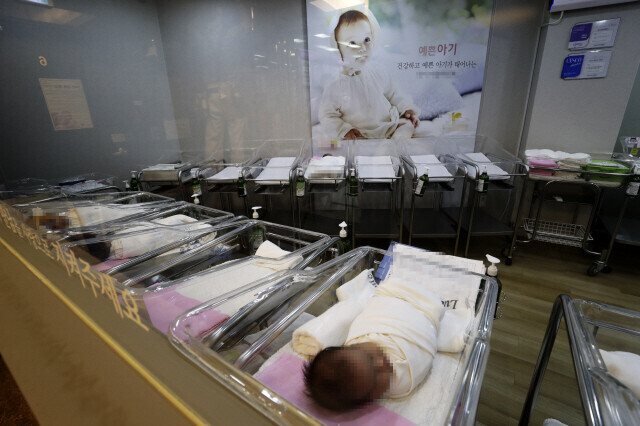hankyoreh
Links to other country sites 다른 나라 사이트 링크
S. Korea’s fertility rate drops to historic low during 2nd quarter of 2020

South Korea’s total fertility rate dropped to a historic low of 0.84 during the second quarter of 2020. Its natural population decline also continued for an eighth straight month with deaths outnumbering births.
According to a report on June population trends released on Aug. 26 by Statistics Korea, a total of 22,193 children were born in the month of June, down by 7.5% (1,799 births) from the same month in 2019. The number of children born between January and June 2020 stood at 142,663, down by 9.9% (15,762 births) from the same period last year. The number of births by month has hit record lows on a year-to-year basis for 51 straight months since April 2016.
For the second quarter of 2020, the total fertility rate (representing the average predicted lifetime number of children born per woman of childbearing age) dropped to 0.84. The rate was down by 0.06 from the first quarter (0.9) and by 0.08 for the same quarter in 2019. It was the lowest for any quarter since quarterly statistics were first tallied in 2009.
“Not only has the population of women in their early 30s been declining, but this phenomenon is also the result of an even larger drop over the past four years in the number of marriages, which has already been falling for eight consecutive years since 2012,” explained Kim Su-yeong, chief of Statistics Korea’s vital statistics division.
At 51,001, the number of marriages during the second quarter was down by 16.4% (11,200) from the same period last year. One factor in this was a rise in the number of couples postponing weddings amid the COVID-19 pandemic. The sharp decline in marriages, which are a leading indicator for births, is expected to also impact the decline in births next year.
The number of deaths in June was calculated at 23,651, an increase of 2.7% (620 deaths) from the same month in 2019. A process of natural population decline, where deaths outnumber births, has been occurring for eight straight months since November 2019. Indeed, 2020 is very likely to record an annual natural population decline for the first time ever.
According to statistics of 2019 births also released by Statistics Korea the same day, the number of children born last year was estimated at 302,700, down by 7.4% (24,100 children) from the previous year. Given the rate of decline in births, a total below 300,000 for this year is seen as a virtual certainty. In 2018, the total fertility rate fell to 0.98, making South Korea the lowest-ranking member of the OECD by total fertility rate and the only one with a rate lower than 1. Last year, the rate slid even further to 0.92.
By Lee Kyung-mi, staff reporter
Please direct comments or questions to [english@hani.co.kr]

Editorial・opinion
![[Column] Season 2 of special prosecutor probe may be coming to Korea soon [Column] Season 2 of special prosecutor probe may be coming to Korea soon](https://flexible.img.hani.co.kr/flexible/normal/500/300/imgdb/original/2024/0426/3317141030699447.jpg) [Column] Season 2 of special prosecutor probe may be coming to Korea soon
[Column] Season 2 of special prosecutor probe may be coming to Korea soon![[Column] Park Geun-hye déjà vu in Yoon Suk-yeol [Column] Park Geun-hye déjà vu in Yoon Suk-yeol](https://flexible.img.hani.co.kr/flexible/normal/500/300/imgdb/original/2024/0424/651713945113788.jpg) [Column] Park Geun-hye déjà vu in Yoon Suk-yeol
[Column] Park Geun-hye déjà vu in Yoon Suk-yeol- [Editorial] New weight of N. Korea’s nuclear threats makes dialogue all the more urgent
- [Guest essay] The real reason Korea’s new right wants to dub Rhee a founding father
- [Column] ‘Choson’: Is it time we start referring to N. Korea in its own terms?
- [Editorial] Japan’s rewriting of history with Korea has gone too far
- [Column] The president’s questionable capacity for dialogue
- [Column] Are chaebol firms just pizza pies for families to divvy up as they please?
- [Column] Has Korea, too, crossed the Rubicon on China?
- [Correspondent’s column] In Japan’s alliance with US, echoes of its past alliances with UK
Most viewed articles
- 1‘We must say no’: Seoul defense chief on Korean, USFK involvement in hypothetical Taiwan crisis
- 2[Editorial] Korea’s surprise Q1 growth requires objective assessment, not blind fanfare
- 3[Column] Season 2 of special prosecutor probe may be coming to Korea soon
- 4Is Japan about to snatch control of Line messenger from Korea’s Naver?
- 5Division commander ordered troops to enter raging flood waters before Marine died, survivor says
- 6No good, very bad game for Korea puts it out of Olympics for first time since 1988
- 7S. Korea “monitoring developments” after report of secret Chinese police station in Seoul
- 8The dream K-drama boyfriend stealing hearts and screens in Japan
- 9[Column] ‘Choson’: Is it time we start referring to N. Korea in its own terms?
- 10Is N. Korea threatening to test nukes in response to possible new US-led sanctions body?